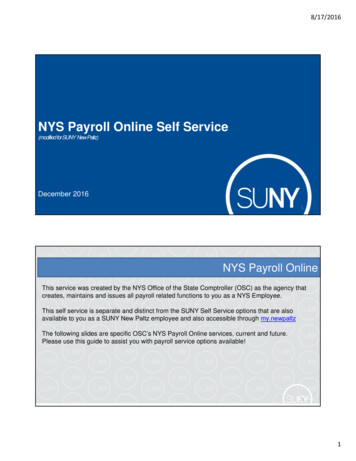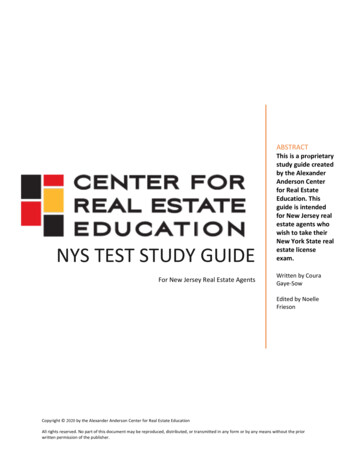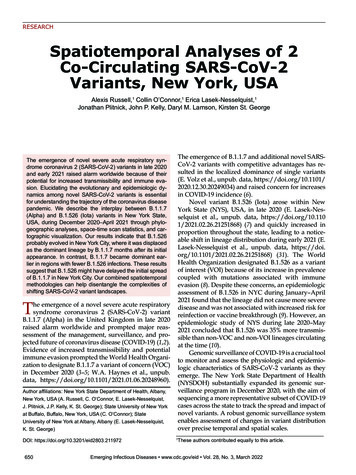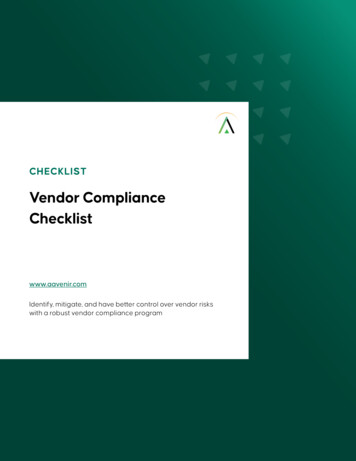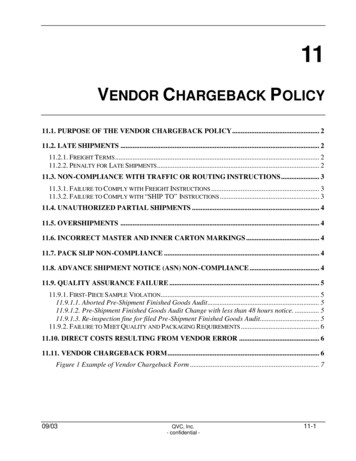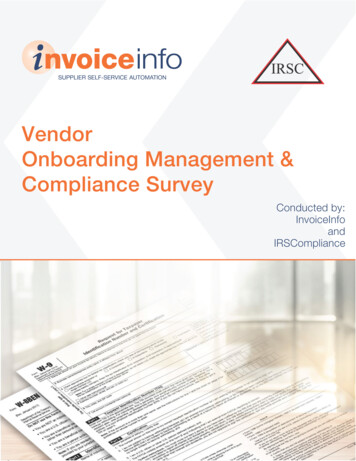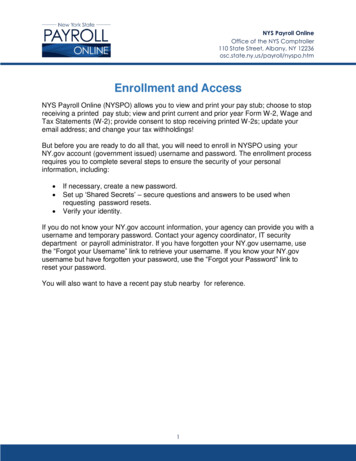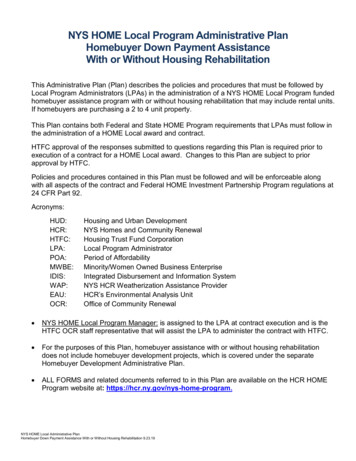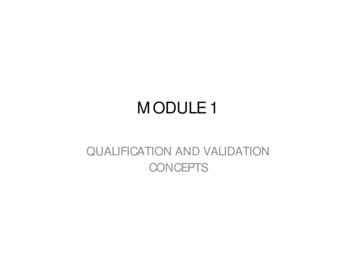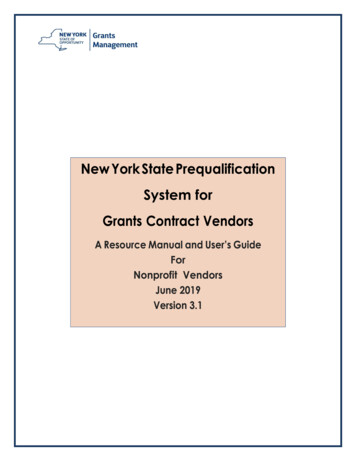
Transcription
System forFor
Table of Contents1. Introduction . 31.1New York Grants Management: A Brief Overview . 31.2First Step: Registration . 31.3Background . 31.4Scope . 32. Vendor Rights . 42.1No Guarantee of Award . 42.2Investigations . 42.3Confidentiality . 43. Requirements. 53.1Eligibility . 53.2Exemptions . 54. Assessment Criteria. 54.1Organizational Capacity . 54.2Legal and Regulatory Compliance. 84.3Organizational Integrity . 144.4Required Documents . 165. Process . 205.1Determination . 205.2Notification . 205.3Record. 205.4Prequalification Officer’s Role . 205.5Maintaining Prequalification . 215.6Prequalification Review . 215.7Suspension or Revocation . 215.8Appeals . 216. APPENDICES . 236.1Required Financial Documents . 236.1.1IRS 990 . 236.1.2CHAR 500/410 . 236.1.3Annual Audit Statement . 246.2Exemptions . 242
1. Introduction1.1New York Grants Management: A Brief OverviewNew York State implemented a suite of reforms to facilitate the grantee process for nonprofits competing forState contracts. These reforms included the creation of the following: Grants Gateway, a statewide online grants management system;Grants Opportunity Portal, which allows nonprofits to search for upcoming RFP opportunities offeredby State agencies;Document Vault, a secure web-based ‘filing cabinet’ which nonprofit vendors can use to store andshare documents with multiple State Agencies;Master Contract for Grants, a simplified, standardized contract; andPrequalification, a system of determining nonprofit vendor eligibility to apply for State contractsbased upon a vendor responsibility determination which assesses, among other things, the vendor’scapacity, legal compliance, and integrity. 1.2First Step: RegistrationNonprofit vendors are required to register with the Grants Gateway. Detailed instructions on how to registeralong with all necessary forms are available at nization.1.3BackgroundState Finance Law §163(9) (f) requires that State agencies deem a bidder responsible prior to awarding thebidder a State contract. Prequalification identifies deficiencies in nonprofits at an earlier stage – beforebidding – which allows state agencies to assist these organizations in correcting deficiencies, whereappropriate. This allows the State to maximize the potential pool of qualified vendors, thus increasingcompetition for services.1.4ScopePrequalification is effective for all New York State grants contracts issued by the following State Agencies: Council on the ArtsDepartment of Agriculture & MarketsDepartment of Corrections and Community SupervisionDepartment of Economic DevelopmentDepartment of Environmental ConservationDepartment of HealthDepartment of LaborDepartment of StateDepartment of TransportationDevelopmental Disabilities Planning CouncilDivision of Criminal Justice ServicesDivision of Housing & Community Renewal3
Division of Veterans' AffairsDormitory AuthorityEmpire State Development CorporationGovernor's Traffic Safety CommitteeInterest on Lawyers AccountJustice Center for Persons with Special NeedsOffice for People with Developmental DisabilitiesOffice for the Prevention of Domestic ViolenceOffice of Alcoholism & Substance Abuse ServicesOffice of Children & Family ServicesOffice of Homeland Security & Emergency ServicesOffice of Indigent Legal ServicesOffice of Mental HealthOffice of Parks Recreation & Historic PreservationOffice of Temporary & Disability AssistanceOffice of Victims ServicesState Education DepartmentState Office for the Aging2. Vendor Rights2.1No Guarantee of AwardPrequalification must not be construed as a guarantee of an award of contract. Prequalification determines avendor’s eligibility to bid for a State contract, or its eligibility for contract renewal or amendment. In theevent that the prequalified vendor submits a bid for a competitive contract, the sponsoring State agency ischarged with making an assessment of whether the vendor is both responsible and has the capacity andrequisite skills to carry out the requested services.2.2InvestigationsIn submitting an application for prequalification, vendors are giving permission to the reviewing State agencyto carry out such investigations and research as the State agency considers necessary to determine whetherthe vendor meets the relevant prequalification criteria.2.3ConfidentialityInformation submitted in a prequalification application will be treated as confidential and will not be disclosedto any parties outside of the State unless the State agency is legally required to do so or in situations where theState agency must obtain legal or financial information from outside parties.Any subsequent information pertaining to the vendor’s performance on specific contracts may only be sharedwith or made available to other State agencies for the purpose of monitoring a vendor’s performance ordetermining a vendor’s continued eligibility for prequalification, unless otherwise requested or permitted bythe vendor.4
3. Requirements3.1EligibilityIncorporated nonprofits vendors are eligible to apply for prequalification. However, an unincorporated entitywishing to do business with New York State should use a legally incorporated and prequalified sponsor orfiscal agent.3.2ExemptionsCertain nonprofit organizations – as defined on the Grants Management website – are exempted from therequirement to prequalify. To receive an exemption, a vendor must, at the time of its registration with theGrants Gateway, submit a: (1) Registration Form for Administrator; and (2) Prequalification Exemption Form,along with the required supporting documentation. Both are available on the Grants Management website.Exempt organizations will receive the Grants Gateway status of “NFP Prequalification Exempt.”4. Assessment CriteriaVendors seeking prequalification will be reviewed for the following criteria: organizational capacity, legal andregulatory compliance, and integrity.4.1Organizational CapacityA nonprofit vendor must demonstrate that it has the organizational capacity, including its operationalmanagement capabilities, to operate a sound human services organization, fulfill its contractual obligations,and deliver services in a cost-effective manner. In making decisions regarding a vendor’s capacity,prequalification specialists will consider the size of the vendor and the length of time it has been in business.Vendors must answer the following questions.Question 1:Does your organization have a system in place whereby someone within the organization is authorized toreceive money, and someone else is authorized to disburse money?RationaleFor large and more established organizations with operating budgets of greater than 1 M – we expectthere to be evidence of proper internal fiscal controls, such as a separation of financial functions. If this isnot present in your agency, please provide an explanation of how you are insuring that internal controlsare maintained. For small nonprofits of less than 1 M – while we recognize that staff may be limited, weexpect organizations to take measures to ensure that internal fiscal controls are implemented.Question 2:Does the organization have an automated payroll system?5
RationaleAutomated systems can save staff time and reduce the risk of error.Question 3:Does your organization use an electronic financial management system?RationaleSound organizations will have an electronic accounting system to minimize error. This can be a program assimple as QuickBooks or a program that is more sophisticated like FundEZ. The nonprofit is stronglyencouraged to consider an electronic financial management system.Question 4:Does the senior staff team meet on a regular and consistent basis?RationaleIn a healthy organization, the senior management team should be meeting regularly to ensure that theorganization is meeting its organizational and contractual objectives, resolving outstanding disputes, andidentifying problems and forecasting solutions.We understand that small organizations with a lean staff tend to “meet” informally, but you should explainhow your senior staff is reviewing its contractual obligations in this informal environment.Question 5:Does your organization conduct regular annual performance evaluations for staff?RationaleOrganizations should conduct performance evaluations annually, at a minimum. Businesses invite legalproblems if performance reviews are not conducted and documented on a regular basis. Please indicatewhether evaluations are being conducted or suggest a plan for implementing such a review policy.ResourcesFor a good example of a performance evaluation and professional development scheme for staff, visit theCommunity Resource Exchange for guidance.6
Question 6:Does your organization create professional development plans for the staff in conjunction with staffperformance reviews?RationaleOrganizations should prepare professional development plans in conjunction with staff performanceevaluations whenever possible. We strongly encourage this practice because it fosters staff retention andsuccession planning.ResourcesFor a good example of a performance evaluation and professional development scheme for staff, visit theCommunity Resource Exchange.Also, please consult with your local and online resources for free professional development opportunities,such as those offered through New York Community Trust, Support Center for Not-for-profit Management,Nonprofit Coordinating Committee of New York, and the New York Council of Nonprofits.Question 7:Is staff required to participate in training annually?RationaleProfessional development and staff training are different and have different objectives. Staff training canbe provided utilizing internal resources and can be conducted with in-house senior staff.Question 8:Identify the Information technology and telecommunications systems utilized by your organization.(Telephone, internet, email account, mobile device, facsimile).RationaleThere is no right or wrong answer here, just provide as much information as possible.7
4.2Legal and Regulatory ComplianceA nonprofit vendor must demonstrate that it has the appropriate legal structure, licenses, andaccreditations to transact business in the State of New York. Questions pertaining to leadership andgovernance seek to ensure accountability and transparency.Vendors must answer the following questions.Question 1:Did a quorum of the board of directors meet regularly throughout the year in conformance with theorganization’s bylaws?RationaleThe nonprofit’s bylaws determine the frequency of board meetings and what constitutes a quorum. Alarge and established organization should follow its bylaws to the letter. A small or emergingorganization should have bylaws it can live up to.ResourcesFor guidance on how to view board management and oversight, refer to this document.Question 2:Does the board of directors take and maintain minutes of all of its regular meetings, in compliance withits bylaws?RationaleThe taking of meeting minutes of all general board meetings is an important component oforganizational record-keeping and a way for boards to maintain and chronicle the nonprofit’s legalstructure. Upon demand, the nonprofit should be able to produce minutes.ResourcesFor a brief article on the need for and value of board minutes, visit the Nonprofit Law Blog.For a template of board meeting minutes, refer to this document.8
Question 3:Is the frequency with which the board meets throughout the year consistent with your organization’sbylaws?RationaleA nonprofit’s bylaws determine the frequency of board meetings and what constitutes a quorum.A large and established organization should follow its bylaws to the letter. A small or start-uporganization should have bylaws it can live up to.ResourcesFor guidance on how to view board management and oversight, refer to this document.Question 4:Did the board committees meet regularly throughout the year in conformance with the organization’sbylaws? If the bylaws do not describe the board committee structure, please describe the number oftimes each committee met during the past year.RationaleThe nonprofit bylaws should offer guidance on both the type of board committees to be formed and thefrequency they should meet throughout the year. At a minimum, an agency should have a fiscalcommittee that should meet prior to the full board meeting.While it is not required, a schedule of committee meetings over the past year would serve as evidencethat your board committees were meeting on a regular basis.ResourcesFor help on understanding board structures and the importance of committees, refer to this document.9
Question 5:Indicate all the items the board of director’s reviews and/or approves (annual operating budget,executive performance and compensation, fundraising plan, internal controls, fiscal controls, annualaudit, Form 990, performance outcomes, other).RationalePlease scroll through the box and check off all options that apply. An organization’s board of directorsshould review all of the indicated items if the board is properly exercising its fiduciary duties. If yourboard reviews some but not all of these items, please explain why.ResourcesFor guidance on a nonprofit board’s obligations, refer to this document.Question 6:Does your board review financial statements on a regular and consistent basis? How frequently doesthe board or board committee review financial statements?RationaleAn organization’s board of directors should review financial statements at least quarterly and/or at everyfull board meeting. If your board does not conduct such reviews, then your board must attend a boardtraining. To become prequalified, your organization must show evidence of this training and creation ofa stronger financial review system.ResourcesFor more information on board oversight, its fiduciary obligations and its role in reviewing financialstatements, refer to this document.Question 7:Does the organization reconcile bank statements on a monthly basis? If not, how often are bankstatements reconciled?RationaleBank statements should be reconciled monthly, or in keeping with procedures of the nonprofit’s fiscalpolicy. Failure to regularly and consistently reconcile bank statements could point to a more seriousoperational deficiency.10
Question 8:State whether the organization has implemented internal fiscal controls by separating fiscal functions,for example.RationaleThere should be a system of checks and balances in a fiscally sound organization. Therefore, thenonprofit should provide information demonstrating that contracts and checks are co-signed over aparticular dollar amount, for example, and/or that parties with contract signing authority are not thesame individuals with fiscal signing authority.ResourcesRefer to this document for guidance on how to put proper internal controls in place, particularly thesection on “Monitoring Internal Controls”, which speaks to separation of duties.Question 8A:Identify those individuals with contract signature authority.RationalePlease list the names of all staff members and/or board members who are authorized to sign contractson behalf of the organization and state whether co- signature is required.Question 8B:Identify those individuals with check writing authority.RationalePlease list the names of all staff members and/or board members who are authorized to sign checks onbehalf of the organization and state whether co- signature is required.Question 9:Please upload all licenses, accreditations, and permits required for your business in the OptionalDocuments section of the Document Vault.Question 10:Does your senior management team regularly view your organization’s overall performance data? Ifnot, please describe the organization’s practice regarding performance data review.RationaleIdeally, the senior management team of a healthy organization should be reviewing performance dataon a monthly or quarterly basis to ensure that contract performance goals are on target.11
Question 11:Which of the following policies and procedures does your organization have in place? Anti-nepotism policyStaff code of conductBoard of Directors Conflict of Interest PolicyConflict of Interest PolicyDiversity PolicyFiscal/Internal Controls PolicySupervision and Performance Evaluation PolicyWhistleblower PolicyEmergency Preparedness PolicySecurity PolicySuccession/Transition PlanPersonnel Recruitment/Screening/Hi ring PolicyPersonnel Retention and Retention PlanCEO Compensation policyDocument retention policyContinuity of Operations PlanNone of the AboveRationaleFor large organizations:We expect your organization to have all of the listed policies in place. If not, please provide explanationand indicate your intentions for adopting same.For small organizations:We prefer that your organization have all of the listed policies in place but, at a minimum, we arerequiring that you have in place all of the policies listed in bold. If not, please provide an explanationand indicate your intentions for adopting these policies. (Exception – Whistleblower Policy is requiredonly of large organizations over 1M.)While we are not currently asking organizations to upload their policies, please be aware that you maybe asked for copies of the policies you claim to have adopted at the time you apply for a State contract.12
Question 12:Does your organization have a written and posted Equal Employment Opportunity (EEO) policy?RationaleEEOC mandates official postings of EEO laws for organizations of greater than 14 employees andstrongly recommends that the required posters be placed conspicuously throughout the worksite. Theofficial EEOC poster includes the EEO regulations pertaining to the Equal Pay Act, which applies to ALLemployers, regardless of size. Therefore, we recommend that all nonprofits post the EEO rules and theEEOC poster, or otherwise distribute them to staff, regardless of size.ResourcesFor information on EEO guidelines and where to get the EEOC posters for the workplace, refer to theEEOC website.Question 13:Please upload your Certificate of Assumed Name, if applicable, in the Optional Documents section ofthe Document Vault.RationaleIf your organization uses a business name that is different from the one listed on your Certificate ofIncorporation, then you must submit a Certificate of Assumed Name. This certificate is sometimescalled the “doing business as (DBA) certificate.”Question 14:Does your organization have Minority and Women-owned Business Enterprises (MWBE) and ServiceDisabled Veteran-Owned Businesses (SDVOB) policies regarding any work it conducts with outsideproviders, sub-contractors, consultants, vendors or partners?RationaleMWBE and SDVOB policies are required of NY State nonprofit vendors and goals will be applied to NYState grants contracts where there are subcontracting opportunities and availability of certified MWBEsand SDVOBs to provide goods or perform services under the contract.ResourcesPursuant to New York State Executive Law Article 15-A and Parts 140-145 of Title 5 of the New YorkCodes, Rules and Regulations (regarding MWBEs) and Executive Law Article 17-B and Part 252 of Title 9of the New York Codes, Rules and Regulations (regarding SDVOB), vendors are required to promoteopportunities for the maximum feasible participation of MWBEs and SDVOBs in the performance ofState contracts. The State has set goals for contract utilization at 30 percent for MWBE and 6 percentfor SDVOBs, but please contact the relevant state agency regarding any agency-specific MWBE andSDVOB policies that may apply. Also, if your organization does not currently have an MWBE policy in13
place, please refer to the Grants Management website and download the template Board Resolutionthat incorporates that new policy language. Review this with your board and have it adopted.4.3Organizational IntegrityThe Integrity questions pertain to matters of organizational and business ethics. Many are drawn directlyfrom the Vendor Responsibility Form, which is familiar to most nonprofits. These questions are structuredin a simple yes or no format. “Yes” answers will, in most cases, invite further inquiry from a prequalificationspecialist; they will not necessarily render a vendor “Not Prequalified.” The term “you” shall refer to theindividual responding to the questionnaire and any member, including senior staff, key employees, andboard members of the organization and its affiliates.Vendors must answer the following Integrity questions:Question 1:Within the past five years, have you or any of your affiliates been suspended or debarred from anycontracting process or been disqualified on any government procurement? If “Yes” answer, identify thegovernment entity/owner(s) involved, project(s), contract number(s), relevant dates and any remedialor corrective action(s) taken and the current status of the issue(s).Question 2:Within the past five years, have you or any of your affiliates been subject to a denial or revocation of agovernment prequalification? If “Yes” answer, identify the government entity/owner(s) involved,project(s), contract number(s), relevant dates and any remedial or corrective action(s) taken and thecurrent status of the issue(s).Question 3:Within the past five years, have you or any of your affiliates been denied a contract or had a bid rejectedbased upon a finding of non- responsibility by a government entity? If “Yes”, provide a brief descriptionof the circumstances of such incident(s) and any remedial or corrective action(s) taken and the currentstatus of the issue(s).Question 4:Within the past five years, have you or any of your affiliates been suspended, cancelled or terminated forcause on any contract? If “Yes” answer, identify the government entity/owner(s) involved, project(s),contract number(s), relevant dates and any remedial or corrective action(s) taken and the current status ofthe issue(s).Question 5:Within the past five years, have you or any of your affiliates had a revocation, suspension, or disbarment ofany business or professional permit and/or license? If "Yes", provide a brief description of thecircumstances of such incident(s) and any remedial or corrective action(s) taken and the current status of14
the issue(s).Question 6:Within the past five years, have you or any of your affiliates been the subject of an investigation, whetheropen or closed, by any government entity for a civil or criminal violation? If "Yes", provide a briefdescription of the circumstances of such incident(s) and any remedial or corrective action(s) taken and thecurrent status of the issue(s).Question 7:Within the past five years have you or any of your affiliates been the subject of an indictment, grant ofimmunity, judgment or conviction (including entering into a plea bargain) for conduct constituting a crime?If "Yes", provide a brief description of the circumstances of such incident(s) and any remedial or correctiveaction(s) taken and the current status of the issue(s).Question 8:Within the past five years, has any individual previously identified, any other key employees not previouslyidentified, or any individual having the authority to sign, execute, or approve bids, proposals, contracts orsupporting documentation with New York State been subject to an investigation, whether open or closed,by any government entity for a civil or criminal violation for any business-related conduct? If "Yes",provide a brief description of the circumstances of such incident(s) and any remedial or corrective action(s)taken and the current status of the issue(s).Question 9:Within the past five years, has any individual previously identified, any other key employees not previouslyidentified, or any individual having the authority to sign, execute, or approve bids, proposals, contracts orsupporting documentation with New York State been subject to an indictment, grant of immunity,judgment, or conviction of any business-related conduct constituting a crime including, but not limited to,fraud, extortion, bribery, racketeering, price fixing, bid collusion or any crime related to truthfulness? If"Yes", provide a brief description of the circumstances of such incident(s) and any remedial or correctiveaction(s) taken and the current status of the issue(s).Question 10:Within the past five years, have you or any of your affiliates received any formal unsatisfactoryperformance assessment(s) from any government entity on any contract? If "Yes", provide a briefdescription of the circumstances of such incident(s) and any remedial or corrective action(s) taken and thecurrent status of the issue(s).Question 11:During the past three years have you failed to file any returns, including, if applicable, Federal Form 990,with any Federal, State or Local government entity? If "Yes", provide a brief description of thecircumstances of such failure(s) to file and any remedial or corrective action(s) taken and the current statusof the issue(s).15
Question 12:During the past three years have you failed to file returns or pay New York State Unemploymentinsurance? If yes, indicate the years you failed to file/pay the insurance and the current status of theliability.Question 13:During the past three years, have you failed to file documentation requested by any New York Stateagency, public authority or other quasi-state entity, with the Attorney General of the State of New York, orwith any other local, State or Federal entity that has made a formal request for information? If yes, indicatethe years the business entity failed to file the requested information and the current status of the matter.4.4Required DocumentsThe following documents are required to be uploaded into the Not For Profit Required Documents sectionof the Document Vault.Document 1:Certificate of Incorporation or Equivalent DocumentDocument DetailsUpload a copy of your certificate of incorporation, State Charter or equivalent document, depending onyour organizational structure.RationaleOnly incorporated entities can prequalify and bid for contracts. If a nonprofit vendor seekingprequalification is unincorporated because it is a program of a parent corporation, then the parentcompany or fiscal agent and not the unincorporated entity must prequalify. If the vendor is a newlyformed entity and has not yet incorporated, it should do so immediately. The Department of State canincorporate an organization within 24 hours with its online expedited service. Please see the followinglink for more information.Acceptable documents include:
4 Division of Veterans' Affairs Dormitory Authority Empire State Development Corporation Governor's Traffic Safety Committee Interest on Lawyers Account Justice Center for Persons with Special Needs Office for People with Developmental Disabilities Office for the Prevention of Domestic Violence Office of Alcoholism & Substance Abuse Services
